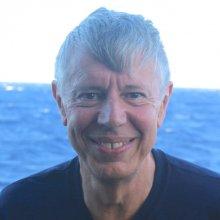
Thomas Hourigan
Tell us about your work/research. What kinds of things do you do?
I lead a major deep-sea research program at the National Oceanic and Atmospheric Administration (NOAA). Our research is designed to map our nation’s deep-sea coral and sponge habitats and understand their ecology. Deep-sea corals and sponges can live for hundreds and even thousands of years, and many species form rich habitats that provide homes for myriad other species. These habitats and the communities they support are vulnerable to human impacts and may take centuries to recover if they recover at all. We work closely with scientists to provide solid, scientific information that will allow managers to be good stewards of these deep-sea resources. We have conducted major expeditions with partners around the U.S. and our research has discovered rich new deep-sea coral habitats and recently been used to protect nearly 100,000 square miles of seafloor in the U.S. Atlantic.
What sparked your initial interest in your career?
I have had a life-long love of the ocean and a fascination with its creatures. I began my research as a graduate student at the University of Hawaii, studying the behavior and ecology of coral reef fishes, particularly the colorful butterflyfishes that feed on living corals. My subsequent research took me from coral reefs in Hawaii, the Caribbean, and Australia, to diving below the ice studying Antarctic fishes, to laboratory research in Japan on fish reproduction. In exploring these science questions, I also became increasingly aware of the changes that were occurring to our ocean ecosystems. This led me to Washington DC, where for nearly thirty years I have worked nationally and internationally at the intersection between research, management, and policy, particularly as it relates to the conservation of our ocean’s biologically-diverse communities, including coral reefs and deep-sea coral ecosystems.
Who influenced you or encouraged you the most?
My mother encouraged my early interest in science, cutting out articles on space exploration and biology from the newspaper for me to read. My ninth grade science teacher, who let me design my own animal behavior project, further fanned the spark. My Ph.D. advisor, Dr. Ernst Reese, gave me opportunities to lead research expeditions, and more importantly, stressed how to balance family and an exciting and successful science career.
What element of your work/study do you think is the most fascinating?
I am amazed how rapidly the recent findings from deep-sea exploration are being translated into conservation action. New technologies, such as those aboard the E/V Nautilus have opened a whole new underwater world. In less than a decade, newly discovered ocean habitats are being protected from adverse human impacts, both in the U.S. and around the world. I feel privileged to be able to play a small part in making these connections.
What other jobs led you to your career?
I have followed a somewhat circuitous route to my current career. I conducted post-doctoral research on fishes in Antarctica and Japan and then came to the U.S. Agency for International Development as a Fellow, working on environmental programs in Latin America. I stayed with the Agency, eventually serving as Senior Policy Advisor for Climate Change and Biodiversity. In this capacity, I participated on U.S. delegations to the early years of negotiations under the United Nations Conventions on Climate Change and Biodiversity. Moving to the National Oceanic and Atmospheric Administration (NOAA) allowed me to focus again on marine science issues.
What are your degrees and certifications?
I got my undergraduate degree in biology at UCLA and my Ph.D. in marine ecology at the University of Hawaii.
What are your hobbies?
I have always loved the outdoors, hiking, backpacking, and scuba diving. Closer to home I enjoy running, tennis, fencing, and curling up with a good book when it’s raining outside.
What advice would you give someone who wants to have a career like yours?
Follow your passions wherever they lead and don’t be afraid to try new things. Science, including marine biology, is becoming far more collaborative and increasingly requires skills from multiple fields. In answering scientific questions and making those answers relevant to society there is room for scientists and policy-makers, as well as artists and educators. You can make a difference!
How did you get involved with the Nautilus Exploration Program? How did you get on the ship?
The Deep Sea Coral Research and Technology Program has collaborated with the Nautilus Exploration Program since the ship came out to the West Coast. I participated as a scientist ashore, but this will be my first opportunity to join an expedition at sea. Dr. Chris Kelley, the chief scientist for this mission was kind enough to recommend me for this cruise.
Expeditions
Thomas participated in the following Ocean Exploration Trust expeditions:
